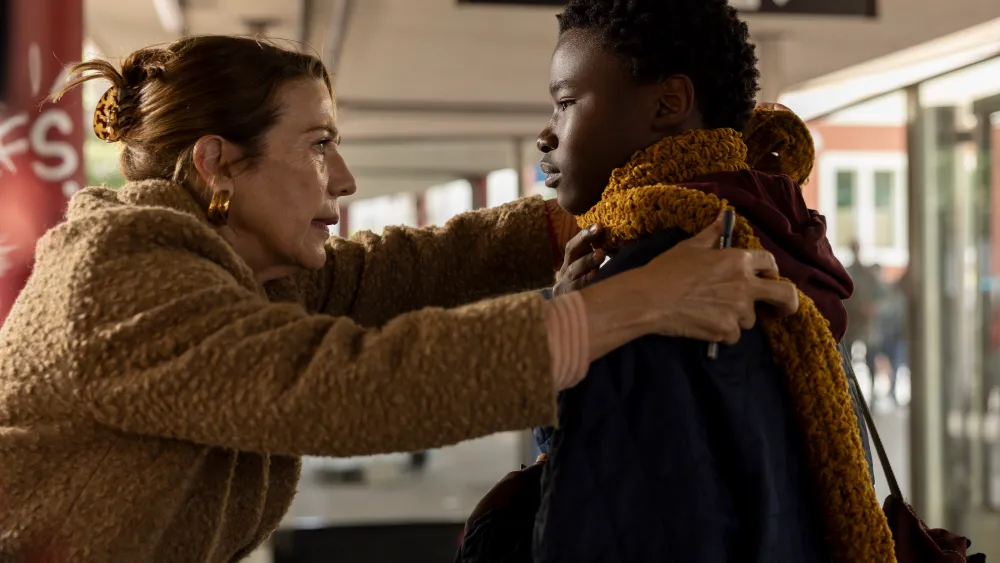
Spanish powerhouse producer Atresmedia Cine kicked of celebrations for its 25th anniversary at the San Sebastian Film Festival where it presented its upcoming slate.
Atresmedia Cine general director Jaime Ortiz de Artiñano led the presentation and a round of toasts where he was joined by some of the actors and filmmakers that have worked on Atresmedia Cine’s multiple films. He also broke the news that Atresmedia Cine would be participating in box office king Santiago Segura‘s upcoming films over the next four years, renewing the collaboration they’ve had on movies like the “Padre no hay más que uno” franchise. Segura’s Bowfinger International Pictures is behind some of the biggest box office hits in Spain.
Since it was founded in November 2000, Atresmedia Cine has set out to support and invigorate Spanish cinema by pairing its broadcast rights acquisition power with robust marketing and communications strategies. Since then, it has been involved in over 180 feature films, becoming one of Spain’s most active and relevant producers.
Key Highlights:
Box Office & Critical Success:
Recent Performance:
Variety spoke to Atresmedia Cine’s Ortiz de Artiñano in the run-up to the company’s slate presentation at the Hotel Maria Cristina:
How has Atresmedia Cine’s strategic vision evolved since its early days, and what will be its key focuses in the years ahead?
The pandemic and the rise of streaming platforms have marked a turning point in the film industry. Before that shift, Atresmedia Cine focused primarily on commercial, mainstream productions — largely driven by high-concept films, in the Hollywood sense. Titles like “La Tribu,”“Ahora o Nunca,”“Toc Toc” or “Villaviciosa de al lado” regularly drew over a million moviegoers
Since the pandemic, the appeal of high-concept films in cinemas has declined — though they continue to perform well on streaming platforms. In contrast, more adult-oriented and auteur-driven cinema, which Atresmedia was already supporting with titles like “Marshland” (“La isla minima”) and “The Realm” (“El reino”), has not only held steady but even seen improved results. This shift became clear in 2021 with films like “Maixabel” and “The Good Boss” (“El buen patron”) topping the box office, followed by “The Beasts,”(“As bestas”) “A House on Fire” (“Casa en flames”) and “Undercover” (“La Infiltrada”).
The traditionally commercial model now endures mostly thanks to figures like Santiago Segura. Beyond that, family films and adult comedies have seen their audience numbers drop by half.
In response, Atresmedia Cine is doubling down on diversification, working closely with top-tier directors, screenwriters and producers to create a varied, high-quality slate. The goal is to offer something that stands out — and gets people off the couch and back into theaters.
Looking ahead, we’re developing projects with talents like Segura, David Trueba, Arantxa Echevarría, Mar Olid, Estel Díaz, Beatriz de Silva, Aritz Moreno, Marcel Barrena and Dani Castro — a diverse mix, all with one thing in common: quality.
What role does Atresmedia Cine play in the internationalization of Spanish cinema? What strategies do you have in place to position your films at festivals, on global platforms, or in cinemas outside of Spain? Does the recent agreement with Disney+ represent a step in that direction?
The agreement with Disney+ currently applies only to television production. In terms of film, we love working with Disney, but we do so on a project-by-project basis, always with theatrical release in mind. We have two films set to premiere with them in 2026.
As for internationalization, it remains a major challenge for Spanish cinema. We’re in a delicate moment — Spanish films are finding it increasingly difficult to travel. Looking ahead, our strategy is to develop more ambitious productions that can reach international audiences and cross borders. “Karateka” is one such project, but there are others.
That said, the system needs to support this ambition. Making Spanish films with significant budgets is becoming harder — and that must change if we want to truly compete on a global level.
How important are international co-productions and partnerships with platforms like Netflix, Prime Video or Disney+ in Atresmedia Cine’s current model?
International co-productions are a valuable tool — both for securing financing and for helping our films reach global audiences. Some of our upcoming releases reflect this strategy: “Siempre es invierno” by David Trueba was shot in Liège and “Karateka” was filmed in Japan with post-production in Belgium.
However, recent regulatory changes have made ambitious international co-productions more difficult. The new General Audiovisual Communication Law only counts productions in Spanish or Spain’s co-official languages toward the investment quota. That makes it harder to co-produce with countries like France or Italy if there’s no reciprocity. A French producer won’t be incentivized to partner on a Spanish-language film if we can’t do the same with a French-language one.
As for the platforms, they play a key role in both financing and international reach. We’ve been working with Netflix for years, and thanks to that partnership, some of our films — “God’s Crooked Lines,”“Politically Incorrect,” “Mikaela” — have been seen around the world. We’ve also collaborated with other platforms. It’s clear they’re a fundamental part of the financing puzzle and an effective way to connect cinema with millions of viewers.
Given the changing audiovisual consumption habits, how does Atresmedia Cine ensure the profitability of its productions? What role do cinemas play compared to digital platforms?
At Atresmedia Cine, we’re involved from the earliest stages of development. We work closely on each project until it’s strong enough to take to market. Once we have a solid script and team, we begin assembling financing — bringing in pay-TV partners, international players, domestic distributors, free-to-air TV rights, public funding tools, sponsorships, etc.
Once all financing avenues are explored, we calculate the cost minus the secured investments. That determines the financial risk — what producers call the “gap.” That gap is what we aim to recover through box office revenue and any unsold rights.
The challenge today is that, with the current state of the box office and international market, taking on performance-based risk is increasingly difficult. That’s why it’s harder to greenlight ambitious budgets.
We take a project-by-project approach, carefully evaluating risk and maximizing all possible funding sources. Unfortunately, sometimes projects we’re passionate about don’t get greenlit because they’re financially unfeasible — but thanks to our team and track record, that rarely happens.
Is Atresmedia Cine exploring new formats such as interactive cinema, augmented reality, or transmedia content? What role does innovation play in your future strategy?
In my experience, the film industry has seen many so-called technological revolutions that ultimately didn’t stick. Aside from major milestones like Cinemascope or color, formats once thought to be game-changers — like 3D — have ended up being niche experiences.
Most audiences still prefer to watch films traditionally: in a dark room, on a big screen, with immersive sound — albeit now with better projection, more comfortable seating and enhanced audio systems. Of course, we stay informed on innovation, but we don’t lose sight of what truly matters: telling great stories meant to be seen in theaters. Where we do focus on innovation is in production processes — anything that helps us do more with less, more efficiently and creatively.
2026 Slate:
“Siempre es invierno,” David Trueba.
Follows Miguel, a landscape architect, who after a breakup in Belgium, begins to rebuild his life alongside Olga, a local volunteer. Opens Nov 7.
“Coartadas,” Martín Cuervo.
A comedy about Miguel, who runs a fake alibi business — until he falls for a judge who hates liars. Chaos ensues. In theaters Nov 28.
“Abuela Tremenda,” Ana Vázquez.
A feel-good comedy about Toñi, a wild and free-spirited grandmother who crashes a corporate retreat to bond with her granddaughter. In theaters Jan. 1, 2026.
“Todos los colores,” Beatriz de Silva.
Coming-of-age drama follows Belén, a sharp-witted 17-year-old in a wheelchair, as she navigates friendship, first love and self-discovery during a transformative final year of high school. Coming 2026.
“La Familia Benetón +2,” Joaquín Mazón.
Follows Toni Benetón as two new babies turn his already chaotic multicultural household upside down. Double the trouble, double the fun. In theaters April 17, 2026.
“Cada día nace un listo,” Arantxa Echevarría.
Sharp satire about fame, ambition and survival. A washed-up reality star is recruited for an art heist with two misfit partners. In theaters May 22, 2026.
“Tres de más,” Mar Olid.
Sharp comedy about happily childless couple Julia and Ernesto whose world turns upside down when three mysterious kids show up calling them “mom” and “dad.” Coming 2026.
“Viaje al país de los blancos,” Dani Sancho.
The true story of Ousman Umar, a young Ghanaian who survives a harrowing journey to Europe and finds hope in Barcelona. Coming 2026.
“Karateka,” Aritz Moreno.
The real-life story of karate fighter Sandra Sánchez, who defied age, odds and expectations to become the greatest karateka of all time — and an Olympic gold medalist at 39. In cinemas Oct. 30, 2026.
Upcoming Shoots:
“El Profesor,” Daniel Castro.
Inspired by real events, it follows Carlos, a professor who falls in love online with Claudia, a much younger model in Colombia. Between loneliness and doubt, he risks everything for an uncertain love.
“La Roja,” Marcel Barrena.



